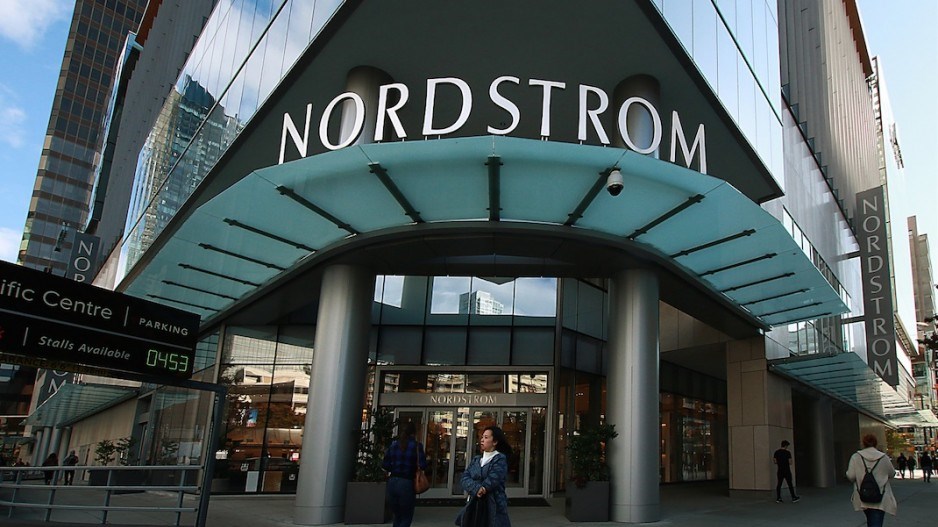Nordstrom’s 220,000-square-foot space at Pacific Centre is a prime location for a new entrant to the downtown Vancouver market, offering plenty of flexibility as destination retail holds its appeal for Canadian shoppers.
“The good news is, that is one of the best pieces of real estate for retail in Canada,” Jane Domenico, senior vice-president and national lead, retail services, with Colliers Real Estate Management Services in Toronto said.
This gives Cadillac Fairview significant leeway in how it repositions the property, from welcoming a new retailer to reconfiguring the space for multiple tenants to even introducing a mix of uses not all of which need to be retail.
Domenico said the strength of retail sales in Canada last year lends momentum to a new or expansion-minded entrant considering the space. Colliers recently undertook a national sector survey that found many retailers looking to increase their physical space requirements this year.
“A lot of them wanted to stay in the same space that they had, but 15 per cent of our respondents said they want to increase their [gross leasable area] and 9 per cent said that they want to decrease,” she noted.
Quebec fashion retailer Simons is one name that has cropped up in comments several observers have made to media since Nordstrom announced its intent to close its Canadian stores.
“We know that Simons has recently announced expansion plans,” Domenico said, flagging them as a potential candidate for Pacific Centre. “Is that an opportunity for them to be in the downtown core as well as being on the North Shore?”
Simons is a particularly apt fit for where consumer spent their money last year.
Retail sales gained 8 per cent nationwide last year, according to Statistics Canada, approaching $736 billion. This was down from 12 per cent growth in 2021 as in-person shopping resumed in the initial period of reopening.
Yet fashion retailers saw sales grow even faster last year than in 2021. Clothing sales accelerated 23 per cent versus 21 per cent a year earlier, while shoe sales increased 19 per cent, up from 13 per cent a year earlier and a dramatic 25 per cent drop in 2020.
“Consumer confidence started to decline n 2022 when we saw interest rates increase,” Domenico said. “Normally, we would see consumers pull back on their retail spending, and in 2022 they did not. We saw the highest retail spending in recent history, and we also saw a significant increase over 2021.”
This was also true in B.C., though sales growth lagged that of Ontario, which led the country with 11 per cent growth. B.C., by contrast, saw just 3 per cent growth while Vancouver reported 5 per cent growth.
Despite sales growth in Vancouver outpacing the province as a whole, downtown Vancouver retailers continued to see high vacancies relative to the suburbs, where Colliers reported vacancies of just 1 per cent at the end of 2022.
While destination retailers, especially luxury brands in the Alberni Street corridor near the Fairmont Hotel Vancouver and Shangri-La did well, those that depended on local workaday traffic suffered.
This points to the importance of tourism in buoying the downtown retail sector, as well as a healthy residential component to the market.
It also explains why a change of use might be a smart move for Cadillac Fairview when Nordstrom leaves the building this summer. Pointing to the makeovers in progress at suburban malls including Brentwood, Lougheed and Richmond Centre, she suggested that a residential component could make better use of the space while creating a market future retailers could serve.
“Constant innovation is part and parcel of being in retail real estate, and being a retailer,” Domenico said.
And further change lies ahead as consumer spending continues to normalize in the months ahead.
Colliers isn’t forecasting a decline in retail sales this year but it expects growth to be flat. The key factors will be the exhaustion of pandemic-era savings and increases in household debt that will push consumer spending back in line with historical norms. With interest rates set to stay high until at least 2024, this heralds more conservative spending patterns.
“We are likely to see a return to the historical correlation between consumer confidence and retail spending,” Colliers said.
This stands to benefit discount retailers, with chains such as Dollarama occupying a favoured position.
“Canadians as a whole are value-conscious as shoppers, it doesn’t matter what income bracket you’re in,” Domenico said. “Everyone shops at Dollarama. It transcends all the consumer demographic bands.”




